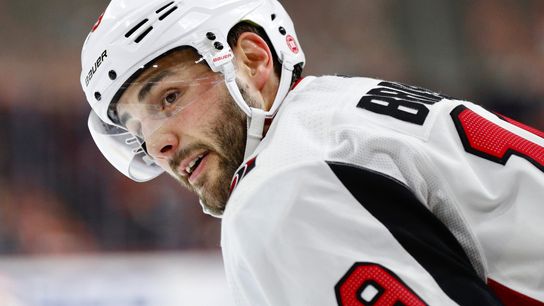RALEIGH, N.C. -- The question seemed simple, really: "Why Derick Brassard?"
Why deal two valuable veterans off the current roster, a top goaltending prospect and two draft picks for Brassard?
Why orchestrate a crazily complicated three-way trade that was initially rejected by the NHL?
Jim Rutherford, who has been around the league all his adult life, the last quarter-century of it as a general manager, called it "the most complex trade I've made" after Friday night's 6-1 rout of the Hurricanes at PNC Arena, adding, "We thought we had it done earlier. We had to make a couple changes. There were cap issues and how the three teams lined up and who went first."
Yikes.
So the aforementioned question, to him, undoubtedly came across as academic.
"Why not?" Rutherford asked back with a smile. "You've seen him play? He's got 18 goals and he's got 38 points."
Yeah, Jim. We've seen him play. He did this to Matt Murray in Pittsburgh just last week ...

... and then put on this clinic later in the same period:

... and we've seen him do all that for years:
We also saw that Vegas, the surprise third party in the trade, swooped in to cover 40 percent of Brassard's $5 million salary this season and next, a vital component for the perpetually cap-crunched Penguins.
But what we now see above all is that Brassard was the missing piece that Rutherford coveted. The third-line center that he felt separated the Penguins and a third consecutive Stanley Cup. And from the moment Pierre Dorion, his counterpart with the Senators, made Brassard available, it's now clear, Rutherford felt compelled to get him.
"We've tried to get more depth at center and get more insurance there," Rutherford said. "Our centers have played pretty well, but you've got to have a lot of strength at center and when we felt we had chance to get a guy like this ... this is a good addition."
One that, as he bluntly acknowledged, came at a heavy cost:
Who knows? Filip Gustavsson, Sweden's hero in this year's World Junior tournament, might be a future franchise goalie. That first-rounder in 2018 and the third-rounder in 2019 might have been impact players down the line.
But, again, it's for Brassard.
"Our mandate is to win now," Rutherford said. "So we can hang onto those futures and they can help three or four years down the road, but what we're trying to do now is win and try and give our team the best chance to win now, and this guy gives us the best chance."
Rutherford praised the contributions and professionalism of Ian Cole and Ryan Reaves, who were dealt separately to the Senators and Knights. Cole was part of two Cup championships here and Reaves was the enforcer that Rutherford thought enough of last summer to send a first-round pick to St. Louis to acquire. But, as Rutherford explained, you have to give up something to get something.
The question now: Is Rutherford done?
With Cole gone, most glaringly, the Penguins are down to seven defensemen.
Asked about that depth in particular, he replied, "Well, it's not as good when you take an Ian Cole out. But when you look at the seven guys here, we like them. We like them a lot."
Rutherford then expressed confidence in the team's depth in the system, saying the Penguins had "three or four" defensemen who could come to Pittsburgh right away and play. That list would include Frank Corrado, Jared Tinordi, Kevin Czuczman, Andrey Pedan and Lukas Bengtsson, though Corrado and Bengtsson are currently injured.
Could he make another move aimed at the defense?
"I don't know. We'll see what happens here in the next few days," Rutherford said. "I don't feel any pressure to do anything. We're comfortable doing this."
It can't be ruled out, and not just because Rutherford himself didn't rule it out. The Penguins now have $1,925,237 in cap space, more than double what was there before this trade, per CapFriendly.com.
No one with the team had any word late Friday night as to when Brassard might arrive. The Penguins play Saturday night in Florida against the Panthers, then have a travel day Sunday, then resume practicing Monday, so it seems most likely he'd join the team at that time. Players on Canadian-based NHL teams often need extra time for immigration issues.
Once he does get to town ...
"He's the type of player that we feel will fit in our system pretty easy," Rutherford said. "It should be pretty seamless."
Ideally a lot more seamless than the process of acquiring him.


